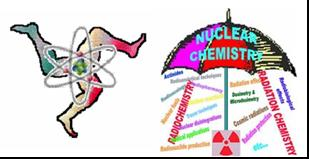Speaker
Mrs
Gülcan Ünak
(Ege University, Faculty of Science, Department of Biochemistry, Bornova, Izmir 35100, Turkey)
Description
1-(Chloromethyl)-4-fluoro-1,4-diazoniabicyclo[2.2.2]octane ditetrafluoroborate is known as SelectfluorTM (Sigma-Aldrich Cas no. 140681-55-6) and is a widely used as an electrophilic fluorinating agent for different kinds of organic compounds. Contrarily, it was not used for 18F fluorination processes, but recently a research team at Oxford University in the UK has tried to label 1-(Chloromethyl)-4-fluoro-1,4-diazoniabicyclo[2.2.2]octane bis(triflate) with 18F as another form of SelectfluorTM. For this procedure, direct fluorination of 1-chloro-methyl-4-aza-1-azoniabicyclo [2.2.2] octanetriflate (accessible in two steps from triethylenediamine, TEDA) was performed in dry CH3CN at -10 °C with fluorine (10 % F2 in N2). In this study, 1-(Chloromethyl)-4-fluoro-1,4-diazoniabicyclo[2.2.2]octane ditetrafluoroborate form of SelectfluorTM was radiolabeled with 18F. For this radiolabeling procedure 250 mL saturated solution of SelectfluorTM in water was prepared and 250 µCi (9.25 MBq) 18F was added. Then, this mixture was evaporated in a water bath up to dryness in about 10 min. The dried mater was again dissolved in 50 µL water and the samples taken from this solution were analyzed using TLC technique. The TLC analyses have showed that SelectfluorTM was radiofluorinated with 18F with about 95 % radiofluorination yield. This radiofluorinated SelectfluorTM with 18F was successfully used for 18F fluorination of 2-fluoro-2-deoxy-D-glucose and insulin. Thus, a new and effective 18F fluorinating agent has been introduced as a widely usable agent in 18F fluorination chemistry.
Author
Mrs
Gülcan Ünak
(Ege University, Faculty of Science, Department of Biochemistry, Bornova, Izmir 35100, Turkey)
Co-authors
Mrs
Cigdem Cetin
(Ege University, Faculty of Science, Department of Chemistry, Division of Nuclear Chemistry, Bornova, Izmir 35100, Turkey)
Mrs
Gözde Sarican
(Ege University, Faculty of Science, Department of Chemistry, Division of Nuclear Chemistry, Bornova, Izmir 35100, Turkey)
Mrs
Selen Ekim
(Ege University, Faculty of Science, Department of Chemistry, Division of Nuclear Chemistry, Bornova, Izmir 35100, Turkey)
Prof.
Turan Ünak
(Ege University, Faculty of Science, Department of Chemistry, Division of Nuclear Chemistry, Bornova, Izmir 35100, Turkey)
